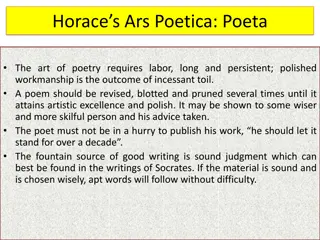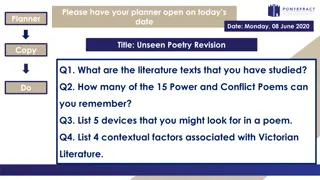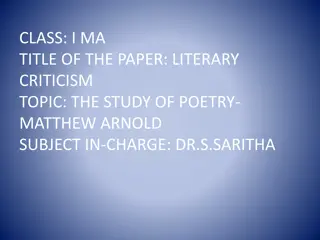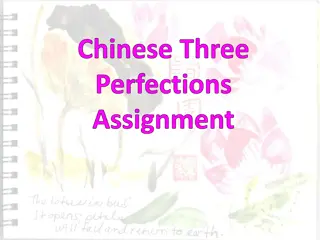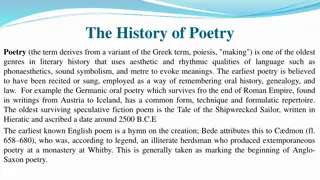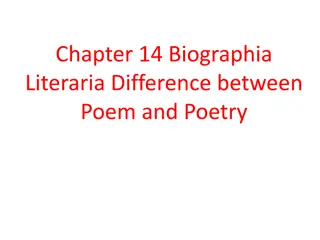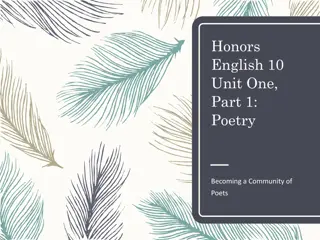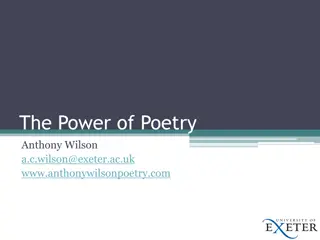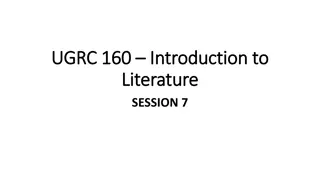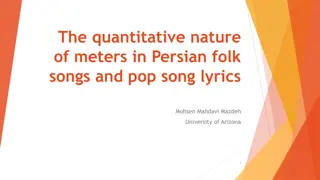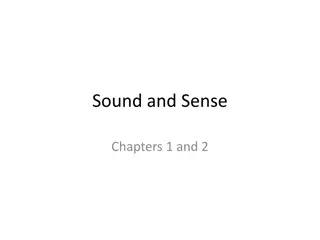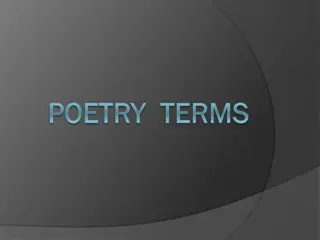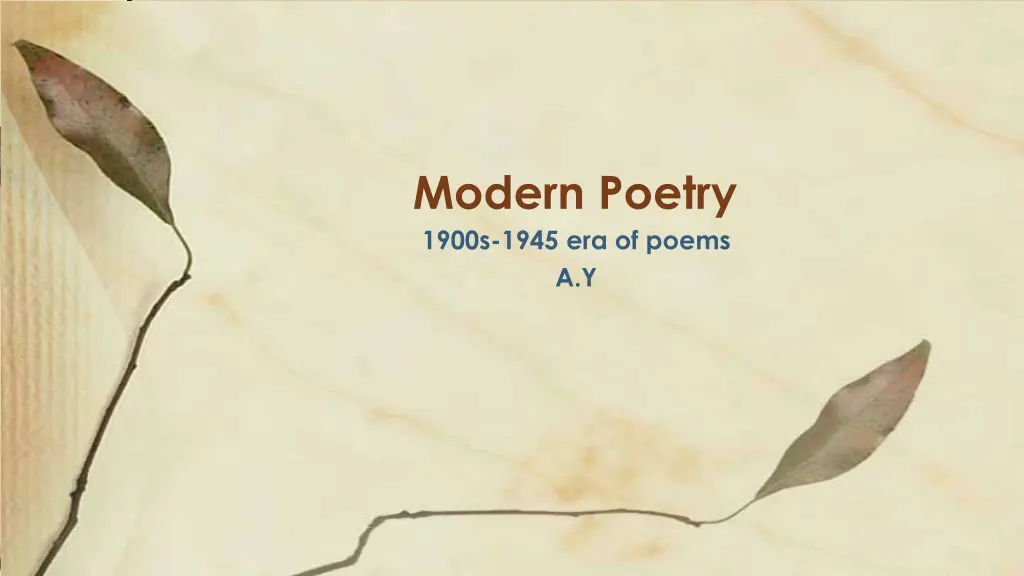
Era of Modern Poetry & Famous Poems Explained
Delve into the era of modern poetry from the 1900s to 1945, exploring the creativity, rebellion, and experimentation of renowned poets and their famous works such as Langston Hughes' "I Dream A World." Understand the evolution of modernist poetry, its influences, and impact on literary expression.
Download Presentation

Please find below an Image/Link to download the presentation.
The content on the website is provided AS IS for your information and personal use only. It may not be sold, licensed, or shared on other websites without obtaining consent from the author. If you encounter any issues during the download, it is possible that the publisher has removed the file from their server.
You are allowed to download the files provided on this website for personal or commercial use, subject to the condition that they are used lawfully. All files are the property of their respective owners.
The content on the website is provided AS IS for your information and personal use only. It may not be sold, licensed, or shared on other websites without obtaining consent from the author.
E N D
Presentation Transcript
Modern Poetry 1900s-1945 era of poems A.Y
What is modern poetry? Modernist poetry was an era beginning in the early 20th century, continuing up until the mid 1940s. Coming out of the 19thcentury, many poets began to experiment with writing and poems, as many found classical poetry overly pompous and gauche. Modern poets viewed themselves as current and abstract, although they often still modeled their poems after classical pieces. Many took inspiration from: Greek literature, Chinese and Japanese poetry, the troubadours, Dante and the medieval Italian philosophical poets, and the English Metaphysical poets. However, this truly was a period of self-expression, rebellion, and imagination. Groups began to form during this period of those who had similar ideas on new sets of rules. One group took on the name of The Imagists, as their poetry relied heavily on strong imagery and allowing the image itself to be the focus of the poem. Descriptive imagery was not common up until this time and using sharp and clear language was a new concept. Famous poets such as Ezra Pound, Amy Lowell, and William Carlos Williams were active members of this group. Continuing into the 1930s, a group named The Objectivists, was formed. This group took direct inspiration from The Imagists, and emphasized intelligence, sincerity, and the author s outtake on the world in their poems. This group consisted of Louis Zukofsky, George Oppen, Charles Reznikoff, Carl Rakosi, Basil Bunting and Lorine Niedecker. This period was greatly focused on breaking old traditions and experimenting with different writing methods.
Famous Poets Oscar Wilde Langston Hughes Walt Whitman Emily Dickinson Sylvia Plath Ezra Pound TS Eliot
Famous poems The Waste Land- T.S Eliot Hysteria- T.S Eliot I Dream A World- Langston Hughes Tired- Langston Hughes Daddy- Sylvia Plath For the fallen- Laurence Binyon
I Dream A World Langston Hughes poem I Dream A World, is composed of a simple rhyme scheme of ABCB in each of the four units of four lines each. This simple rhyme scheme leads to the poem having a lilting rhythm that is easy-going on both the ears and the mind of the reader. This quality of the poem almost reads like the special state of superficial sleep in which dreams occur. Although this poem is short and sweet, the message that Hughes delivers is one that can resonate on a deeper level. The period that Hughes grew up and lived in was one filled with prejudice and racism towards African Americans. Slavery had been abolished decades prior, however; the Jim Crow laws were not abolished until the mid 1960s. Hughes poem describes a utopia in which poverty, racism, greed, and war does not exist. It is a whimsical like poem, filled with hope and simplicity.
I Dream A World The poem begins with the line I dream a world where man, no other man will scorn. This references the racism of this time period, when African Americans were treated as inequal members of society. Hughes undoubtedly was subjected to racism, and he dreams of a world where he would not be scorn for his race. The poem continues, stating Where love will bless the earth, and peace it s path adorn. The personification of love and peace are poetic devices that embellish the hope in this poem. Giving love, the God-like quality of being able to bless something. Love takes on the role of a pastor and brings religious elements into the poem. America in the 1900s had separated churches for people of colour versus Caucasians. Whilst keeping in mind who his audience was, Hughes was able to incorporate some of his personal beliefs into the poem. I dream a world where all, will know sweet freedom s way, is a line that shows Hughes desire to live in a world free of inequality. Freedom was and is not something that is given to everyone, but Hughes hopes that someday all will be granted this. Where greed no longer saps the soul nor avarice blights our day, is integral to the poem, as it shows that Hughes writes with the idea of man s hubris in mind. He is aware that in the downfall of humanity, greed will play a powerful part. The poem continues with A world I dream, where black or white, whatever race you be, will share the bounties of the earth and everyman is free. Hughes flips his classic line of I dream a world, showing that they mean the same thing, and that they can be inverted without ruining balance. This concept can be applied to the entire poem, as it reflects race.
I Dream A World Moving onwards, Hughes is direct with his dream of equality for everyone no matter their race. He wishes that humanity can come together as a whole to share the bounties of the earth, without letting discrimination and jealously come between them. The final line of the poem, states Where wretchedness will hang its head and joy, like a pearl, attends the need of all mankind- of such I dream, my world! Wretchedness is personified and imagery is used to picture a devilish creature hanging its head in shame. Joy is compared to a pearl, perhaps to describe the joy one would experience when receiving a gift such as a pearl. This would be a rare occurrence, making it special. Joy is then personified, as Hughes wishes it attends mankind s needs, as he knows they will never truly be met. Finally, Hughes states that he dreams of such a perfect world, and it is his world. There is an optimistic tone to the entire poem, especially in the last line. The exclamation mark is as if Hughes is waking up from a good dream, after having experienced his ideal paradise in his mind.
For the Fallen The poem For the fallen, is written by Laurence Binyon. When writing this poem, Binyon was at home, reflecting on the sacrifices young men were making across the globe for the sake of freedom. Binyon was alive during the first world war. This was a horrific, shocking event that sparked a lot of creative development in literature, art and music. The message of this poem, like the last, is quite clear. This poem is about the noble sacrifices made by soldiers for their country. The soldiers who had fallen during the time of war shall never grow old, and as their families mourn the loss of their sons and brothers. The tone of this poem is patriotic, although solemn and celebratory in noting the bravery of England s soldiers. Allusions in this poem help to reinforce this idea. In the third line of the first stanza, when describing the relationship between a son and mother, Binyon uses the term Flesh of flesh, which is an allusion to Adam s words in the book of Genesis.
For the Fallen Furthermore, the phrases using immortal spheres and music in the midst of desolation suggests the ancient philosophical idea of the music of the spheres. This is the concept that the Sun, the Moon, and the planets of the solar system move in harmony with each other, producing a sort of sublime music . This presents the deaths of the soldiers on a metaphysical plane. Age shall not weary them, nor the years condemn , the second line of the fourth stanza, is also an allusion, this time to William Shakespeare s Antony and Cleopatra and Enobarbus description of the Egyptian queen: Age shall not wither her, nor custom stale her infinite variety. There is a great amount of respect in this poem. At first glance, it may appear solely melancholic, but Binyon also has a great amount of pride for his country s troops. These men will live forever in the eyes of the nation, as people who sacrificed themselves for others.
For the Fallen The beginning stanza goes With proud thanksgiving, a mother for her children, England mourns for her dead across the sea. Flesh of her flesh they were, spirit of her spirit, fallen in the cause of the free. The sense of this poem is that all those who fought were children of England, making it one great nation and one great family. The entire country feels the pain of mourning when a soldier is lost. England is personified as a mother mourning for her child. The next stanza reads Solemn the drums thrill; Death august and royal. Sings sorrow up into immortal spheres, there is music in the midst of desolation and a glory that shines upon our tears. The dead are honoured by playing mournful music, (and as previously discussed) the soldiers are part of a larger goal than each person s individualistic needs. The dead soldiers are immortalized just as music is immortal. They shall grow not old, as we that are left grow old: Age shall not weary them, nor the years contemn. At the going down of the sun and in the morning, we will remember them. This is both a curse and a gift. Although the lives of the soldiers were short, they are forever immortalized in our minds as young and brave. They need not fear old age, as they have already passed on. They mingle not with their laughing comrades again; They sit no more at familiar tables of home; They have no lot in our labour of the day-time; They sleep beyond England s foam. This stanza is darker, and more realistic of what the soldiers will be missing as they sleep for eternity. They no longer get to experience the joys of life or build friendships. They sleep beyond England s foam: this could either mean they died at sea, or they sleep beyond what is comprehendible to the human mind.
For the Fallen But where our desires are and our hopes profound, felt as a well-spring that is hidden from sight, To the innermost heart of their own land they are known, as the stars are known to the Night Hopes and desires are endless. They are a constant source coming from a place in us that we cannot see. Our war dead remain in our hearts. There is a desire to keep them with us. It is a desire for which we do know the location their loss to us is the location. When we look up at the stars, we remember them. Night cannot take the memory of them away from us. The final stanza reads As the stars that shall be bright when we are dust, moving in marches upon the heavenly plain; As the stars that are starry in the time of our darkness, to the end, to the end, they remain. Eventually, all life returns to dust. Truly nothing can be immortalized, but by remembering our fallen soldiers on remembrance day and giving them our thanks, we keep them in our hearts.
The End By Alyson Young



